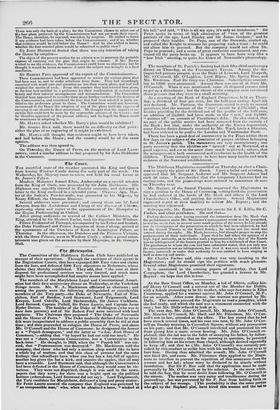ebe Sitchvpolisi.
The Committee of the Middlesex Reform Club have published an account of their operations. Through the exertions of their agents in the Registration Courts, they have expunged 300 Tory votes and claims from the lists, and defeated 1000 Tory objections to Reformers, whose claims they thereby established. They add, that "the stun at their disposal for professional services was very limited, and much more might have been accomplished had ampler means been applied."
The members of the Marylebone Loyal and Constitutional Associ- ation had their first anniversary dinner on Wednesday, at the Yorkshire Stingo tavern. Mr. W. A. Mackinnon officiated as chairman ; and among the guests were the following distinguished or considerable members of the Tory party—the Duke of Newcastle, Earl of Win- chilsea, Earl of Bandon, Lord Stormont, Lord Teignmouth, Lord Kenyon, Lord Colville, Lord Skelmersdale, Sir James Cockburn. Lord Bernard, Captain Polhill, Sir Peter Laurie, and Captain Jonas Ryder Burton. The healths of the Duke of Wellington (who was to have been present) and of Sir Robert Peel were received with loud applause. The Chairman then proposed " The Duke of Newcastle and the House of Peers." The Duke modestly declared that he never felt more incapacitated to address a public assembly than he did at that time ; and then proceeded to eulogize the House of Peers, and abuse Mr. O'Connell and the House of Commons: he designated the former as a "Popish demagogue," and the latter as "a low, Irish House of Commons,"—adding that "he hoped he had not said too much." He was not a "sham, spurious Conservative, but a Conservative to the back-bone." He thought, in 1829, when the " Popish bill" was car- ried, that "Protestantism was destroyed." Mr. Mackinnon told the company, that those who had only a mutton chop would like to have a whole leg of mutton, and that this class of persons had the same feelings that schoolboys have when one boy has a hat-full of apples; another boy gives the hat a kick, and scatters the apples, that all may have a scramble. Lord Stormont said, that although the Conservatives had been defeated in the House of Commons, they would soon be vie. torious. They were not dispirited, though it was said in the news- papers that they were; for there was a bright spot on the political horizon (whereabouts, Lord Stormont did not say). Lord Teignmouth, the Tory candidate for Marylebone, delivered a long and prosy oration. Sir Peter Laurie assured the company that England was governed by "an irresponsible man," who, when he obtained a boon, "winked at
his tail," and said, " This is all my eye; it's only an instalment." Sir Peter spoke in terms of high admiration of "two of the greatest patriots of the age, Lord Stanley and Sir James Graham ;" and he proposed their bealths. Dr. Pope, one of the Stewards, started up, and called the Knight to account for proposing such a toast : he could not allow him to proceed. But the company would not allow Dr. Pope to proceed; and a scene of great confusion commenced, and con- tinued till the party broke up. It appears to have been very like a "low Irish" meeting, to quote his Grace of Newcastle's phraseology.


























 Previous page
Previous page